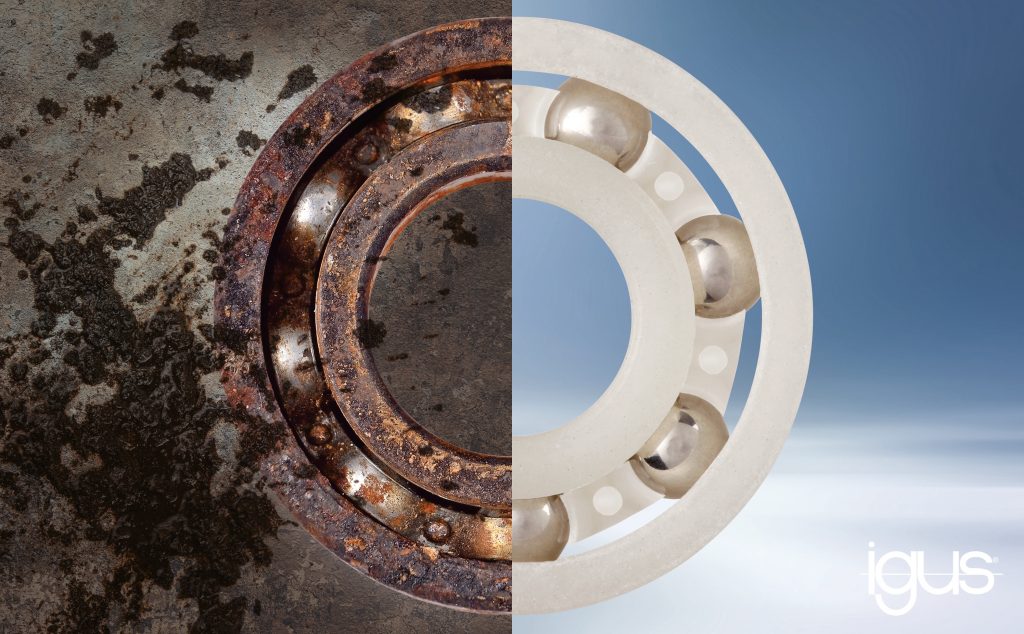Metal, polymer, ceramic – How do you decide which ball bearing is best for your application?
Vishaka Upreti | 15 April 2021
Metallic ball bearings are predominantly used in most applications in classic mechanical engineering. They are number 1 in terms of global sales and are suitable for a variety of different mechanical engineering applications. However, you always reach a limit if there are additional requirements for the bearing within the application, i.e. additional load capacity or speed.
Suitability is key for all applications. Ensuring you choose the correct material for industries such as the food industry or medical technology is paramount. Plant manufacturers often require food certification in accordance with EU standard 10/2011 or FDA (American authority: Food and Drug Administration).

The advantage of polymer is the variety of materials. This means that different base polymers can be selected for a wide variety of applications and their properties are suited for each application. In recent years, base polymers such as POM, PP, PEEK and other mainstream plastics have become established in the ball bearing sector.
Ball bearings made of plastic can be suitable for the following industries and applications:
– Food industry Food contact
– Medical technology FDA conformity
– Chemical industry Chemical resistant
– Textile industry No dust or dirt build up
– Vacuum / high temperatures No destruction of the lubricant
– Special applications such as MRI Metal-free or metal detectors
Which material is best?
This question can only be answered knowing all the parameters of the application, certain materials suit certain applications. Both polymers and ceramics have disadvantages compared to metals but on the flip side, they also have advantages. Metals have a good combination of hardness and elasticity, however, polymers on the other hand, are significantly softer and can deform more quickly, especially at high temperatures.

Ceramics are very hard, but they also have the lowest elasticity and can break quickly under impact loads. In addition, the heat dissipation from ceramic and polymer is less than from metal. Therefore, metal bearings are limited in terms of the maximum speed that can be achieved.Other impacts on the bearings such as load, wear and moisture absorption need to be considered. Aqueous media acts like lubricants for polymers and ceramics. With a suitable design, the friction values can be stabilised at a low level by 0.1 or even lower. The wear is very low, so that in general, a very long service life is achieved.
What is there to consider when installing igus® ball bearings?
igus® is one of the few manufacturers worldwide to manufacture ball bearing rings by injection moulding, the xiros® range. This brings customers the following advantages:
– High wear resistance due to the shape under high pressure
– Homogeneous material distribution
– Cost-effective production
– Simplification of ball bearing assembly
Due to this manufacturing process, different rules apply for measurement and assembly compared to metallic or ceramic ball bearings. The outer ring of the polymer ball bearings is conical. This simplifies installation in an intended housing. The bearing play is reduced after being pressed into an H7 holder. The bearings must therefore be measured across the entire width of the ball bearing. Starting at 90 ° from the injection point.
Can one calculate the life of ball bearings?
The lifespan of metal ball bearings can be designed but cannot be predicted. It is different with igus xiros ball bearings: our constant wear tests mean that we have a large wear database and can therefore calculate the expected service life of ball bearings.
Click here for the lifetime calculator for xiros® ball bearings
As discussed at the beginning, each application is different, with different parameters and different requirements. igus with its life calculator can help you predict the lifetime of the bearings, enabling planning for production to be made easier. The xiros bearings can give both the metal and ceramic ones a run for their money.

